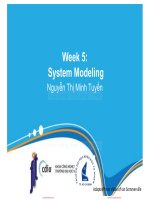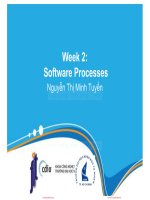Lecture Introduction to software engineering: Week 3 - Nguyễn Thị Minh Tuyền
Bạn đang xem bản rút gọn của tài liệu. Xem và tải ngay bản đầy đủ của tài liệu tại đây (25.52 MB, 68 trang )
Week 3:
Project management
Nguyễn Thị Minh Tuyền
Adapted from slides of Ian Sommerville
CuuDuongThanCong.com
/>
Topics covered
1.
2.
3.
4.
Project planning
Risk management
Managing people
Teamwork
2
CuuDuongThanCong.com
/>
Software project management
£ Concerned with activities involved in
p ensuring that software is delivered on time and on
schedule and
p accordance with the requirements of the organisations
developing and
p procuring the software.
£ Is needed because ...
p software development is always subject to budget and
schedule constraints that are set by the organisation
developing the software.
£ Good management cannot guarantee project success.
However, bad management usually results in project
3
failure.
CuuDuongThanCong.com
/>
Success criteria
£ Important goals for most projects:
p
p
p
p
Deliver the software to the customer at the agreed time.
Keep overall costs within budget.
Deliver software that meets the customer’s expectations.
Maintain a happy and well-functioning development
team.
4
CuuDuongThanCong.com
/>
Software management distinctions
£ The product is intangible.
p Software cannot be seen or touched.
£ Many software projects are 'one-off' projects.
p Large software projects are usually different in some
ways from previous projects.
£ Software processes are variable and organizationspecific.
p We still cannot reliably predict when a particular
software process is likely to lead to development
problems.
5
CuuDuongThanCong.com
/>
Factors influencing project management
£ Company size
£ Software customers
£ Software size
£ Software type
£ Organizational culture
£ Software development processes
These factors mean that project managers in different
organizations may work in quite different ways.
6
CuuDuongThanCong.com
/>
Universal management activities
£ Project planning
p Project managers are responsible for planning, estimating and
scheduling project development and assigning people to tasks.
£ Reporting
p Project managers are usually responsible for reporting on the
progress of a project to customers and to the managers of the
company developing the software.
£ Proposal writing
p Project managers write a proposal to win a contract to carry out
an item of work. The proposal describes the objectives of the
project and how it will be carried out.
7
CuuDuongThanCong.com
/>
Universal management activities
£ Risk management
p Project managers assess the risks that may affect a
project, monitor these risks and take action when
problems arise.
£ People management
p Project managers have to choose people for their team
and establish ways of working that leads to effective
team performance.
8
CuuDuongThanCong.com
/>
Topics covered
1.
2.
3.
4.
Project planning
Risk management
Managing people
Teamwork
9
CuuDuongThanCong.com
/>
Project planning
£ One of the most important jobs of a software project
manager.
£ Project planning involves
p break down the work into parts and assign these to project team
members,
p anticipate problems that might arise and prepare tentative solutions
to those problems.
£ The project plan
p created at the start of a project,
p used to communicate how the work will be done to the project team
and customers, and to help assess progress on the project.
10
CuuDuongThanCong.com
/>
Planning stages
£ At the proposal stage
p when you are bidding for a contract to develop or provide a software
system.
£ During the project startup phase
p when you have to plan who will work on the project, how the project
will be broken down into increments, how resources will be
allocated across your company, etc.
£ Periodically throughout the project
p when you modify your plan in the light of experience gained and
information from monitoring the progress of the work.
11
CuuDuongThanCong.com
/>
Proposal planning
£ Planning may be necessary with only outline
software requirements.
£ The aim is to provide information that will be used
in setting a price for the system to customers.
£ Project pricing involves
p estimating how much the software will cost to develop,
p taking factors such as staff costs, hardware costs,
software costs, etc. into account.
12
CuuDuongThanCong.com
/>
Project startup planning
£ Know more about the system requirements but do
not have design or implementation information.
£ Create a plan with enough detail to make
decisions about the project budget and staffing.
p This plan is the basis for project resource allocation
£ The startup plan should also define project
monitoring mechanisms.
p Keep track of the progress and
p Compare actual and planned progress and costs.
£ A startup plan is still needed for agile development
to allow resources to be allocated to the project.
13
CuuDuongThanCong.com
/>
Development planning
£ The project plan should be regularly amended as
the project progresses and you know more about
the software and its development
£ The project schedule, cost-estimate and risks have
to be regularly revised.
14
CuuDuongThanCong.com
/>
The project planning process
«system»
Project planner
Identify
constraints
[project
finished]
[unfinished]
Do the work
Identify
risks
Define project
schedule
Define
milestones
and
deliverables
[ no problems ]
Monitor progress
against plan
[minor problems and slippages]
Initiate risk
mitigation actions
[serious
problems]
Replan
project
15
CuuDuongThanCong.com
/>
Project scheduling
16
CuuDuongThanCong.com
/>
Project scheduling
£ Is the process of deciding how the work in a project will be
organized as separate tasks, and when and how these
tasks will be executed.
£ Estimate the calendar time needed to complete each task,
the effort required and who will work on the tasks that have
been identified.
£ Estimate the resources needed to complete each task, the
time required on specialized hardware, and what the travel
budget will be.
17
CuuDuongThanCong.com
/>
Project scheduling activities
£ Split project into tasks and estimate time and
resources required to complete each task.
£ Organize tasks concurrently to make optimal
use of workforce.
£ Minimize task dependencies to avoid delays
caused by one task waiting for another to
complete.
£ Dependent on project managers intuition and
experience.
18
CuuDuongThanCong.com
/>
The project scheduling process
Identify
activities
Identify activity
dependencies
Software requirements
and design information
Estimate resources
for activities
Allocate people
to activities
Create project
charts
Bar charts describing the
project schedule
19
CuuDuongThanCong.com
/>
Scheduling problems
£ Estimating the difficulty of problems and hence the cost of
developing a solution is hard.
£ Productivity is not proportional to the number of people
working on a task.
£ Adding people to a late project makes it later because of
communication overheads.
£ The unexpected always happens. Always allow
contingency in planning.
20
CuuDuongThanCong.com
/>
Schedule presentation
£ Graphical notations are normally used to illustrate the
project schedule.
£ These show the project breakdown into tasks. Tasks should
not be too small. They should take about a week or two.
£ Calendar-based
p Bar charts (Gantt charts) are the most commonly used
representation for project schedules.
p They show who is responsible for each activity, the expected
elapsed time, and when the activity is scheduled to begin and end.
£ Activity networks
p Are network diagrams, Show task dependencies
21
CuuDuongThanCong.com
/>
Project activities
£ Project activities (tasks) are the basic planning
element. Each activity has:
p a duration in calendar days or months,
p an effort estimate, which shows the number of persondays or person-months to complete the work,
p a deadline by which the activity should be complete,
p a defined end-point, which might be a document, the
holding of a review meeting, the successful execution of
all tests, etc.
22
CuuDuongThanCong.com
/>
Milestones and deliverables
£ Milestones are stages in the project where a
progress assessment can be made.
£ Deliverables are work products that are delivered
to the customer, e.g. a requirements document for
the system.
23
CuuDuongThanCong.com
/>
Tasks, durations, and dependencies
Task
Effort (person-days)
Duration (days)
T1
15
10
T2
8
15
T3
20
15
T4
5
10
T5
5
10
T2, T4 (M3)
T6
10
5
T1, T2 (M4)
T7
25
20
T1 (M1)
T8
75
25
T4 (M2)
T9
10
15
T3, T6 (M5)
T10
20
15
T7, T8 (M6)
T11
10
10
T9 (M7)
T12
20
10
T10, T11 (M8)
CuuDuongThanCong.com
Dependencies
T1 (M1)
/>
24
Activity bar chart
Week 0
1
2
3
4
5
6
7
8
9
10
11
Start
T1
T2
(M1/T1)
T3
T4
(M3/T2 & T4)
T5
(M4/T1& T2)
T6
T7
(M2/T4)
T8
(M5/T3 & T6)
T9
(M6/T7 & T8)
T10
(M7/T 9)
T11
(M8/T10 & T11)
T12
25
Finish
CuuDuongThanCong.com
/>









